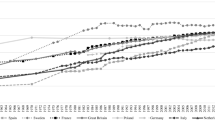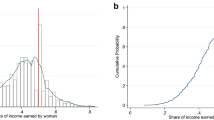Abstract
Although women’s presence in the labor force has shown a marked increase, much of the existing research on housework suggests that for heterosexual families men’s and women’s housework contributions remain unequal. Scholars of domestic labor suggest that this influx of privileged women into the labor force, coupled with growing income inequality has caused an increase in the demand for paid domestic labor. This re-delegation of domestic labor may in some ways represent a threat to privileged women’s self image as caring for family has been inextricably part of the ideological construction of what constitutes a good wife and mother. Research demonstrates that even as families hire someone for domestic/cleaning labor women feel “obligated” to retain control of its’ supervision. This is not necessarily challenging the existing gendered division of labor but rather displacing housework along raced and classed lines. Utilizing data from 30 qualitative interviews with white class privileged women who hire domestic workers; this paper explores the motivations for hiring domestic workers, the ways in which participants conceptualized this labor as gendered, and finally how they navigated the guilt that often times accompanied hiring domestic workers.
Similar content being viewed by others
Notes
It is important to note that while I am tracing the academic development of intersectional theories, much of this theorizing was done outside of academic spaces within the context of grassroots activist movements.
It is important to note however, that “traditionally feminine ways of relating” are constructed within a larger system of patriarchy and therefore I am also critical of this possibly essentialist justification.
One was not transcribed because of a mechanical error in recording and the other tape was destroyed because of the participant’s discomfort with what she had shared.
References
Amott, T., & Matthaei, J. (1996). Race, gender & work: A multicultural economic history of women in the United States. Boston, MA: South End Press.
Anderson, B. (2001). Just another Job? Paying for domestic work. Gender and Development, 9, 1.
Bernard, R. H. (2000). Social research methods: Qualitative and quantitative approaches. Thousand Oaks, CA: Sage.
Coltrane, S. (2001). Research on household labor: Modeling and measuring the social embeddedness of routine family work. In R. M. Milardo (Ed.), Understanding families into the new millennium: A decade in review. Minneapolis, MN: National Council on Family Relations.
Douglas, S., & Michaels, M. (2004). The mommy myth: The idealization of motherhood and how it has undermined all women. New York, NY: Free Press.
Ehrenreich, B. (2004). Maid to order: The politics of other women’s work. In A. R. Hochschild & B. Ehrenreich (Eds.), Global women: Nannies, maids, and sex workers in the new economy. New York, NY: Owl Books.
Ehrenreich, B., & Hochschild, A. R. (2004). Introduction. In B. Ehrenreich & A. R. Hochschild (Eds.), Global women: Nannies, maids, and sex workers in the new economy. New York, NY: Owl Books.
Eisenstein, Z. (1979). Capitalist patriarchy and the case for socialist feminism. New York, NY: Monthly Review Press.
Friedan, B. (1963). The feminine mystique. New York, NY: Dell Publishing Company Incorporated.
Glaser, B. G., & Strauss, A. L. (1967). The discovery of grounded theory: Strategies for qualitative research. New York, NY: Aldine De Gruyter.
Higginbotham, E. (1994). Black professional women: Job ceilings and employment sectors. In M. B. Zinn & B. T. Dill (Eds.), Women of color in USA society. Philadelphia, PA: Temple University Press.
Hill Collins, P. (2000). Black feminist thought: Knowledge, consciousness, and the politics of empowerment. New York, NY: Routledge.
Hill Collins, P. (1986). Learning from the outsider within: The sociological significance of black feminist thought. Social Problems, 93, 6.
Hochschild, A. R. (2004). Love and gold. In A. R. Hochschild & B. Ehrenreich (Eds.), Global women: Nannies, maids, and sex workers in the new economy. New York, NY: Owl Books.
Hochschild, A. R. (2003). The second shift: Working parents and the revolution at home. New York, NY: Penguin.
Hochschild, A. R. (2003). The managed hand: Commercialization of human feeling. Berkeley, CA: University of California Press.
Gonalons-Pons, P. (2015). Gender and class housework inequalities in the era of outsourcing hiring domestic workers in Spain. Social Science Research, 52, 208–218.
Hooks, B. (1984) Feminist theory: From margin to center. Boston, MA: South End Press. (1981) A’int I a Woman. Boston, MA: South End Press.
Hondagneu-Sotelo, P. (2001). Doméstica: Immigrant workers cleaning and caring in the shadows of affluence. Berkeley, CA: University of California Press.
Kang, M. (2003). The managed hand: The commercialization of bodies and emotions in Korean immigrant owned Nail Salons. Gender and Society, 17, 6.
Kroska, A. (2004). Divisions of domestic work: Revising and expanding the theoretical explanations. Journal of Family Issues, 25, 900–932.
Lachance-Grzela, M., & Bouchard, G. (2010). Why do women do the Lion’s share of housework? A decade of research. Sex Roles, 11(12), 767–780.
Lorber, J. (2001). Gender inequality: Feminist theories and politics. Los Angeles, CA: Roxbury Press.
Mattingly, D. J. (2001). The home and the world: Domestic service and international networks of caring labor. Annals of the Association of American Geographers, 91, 2.
McCall, L. (2005). The complexity of intersectionality. Signs, 30, 3.
McCall, L. (2001). Complex inequality: Gender, class and race in the new economy. New York, NY: Routledge.
Moras, A. (2010). Colour-blind discourses in paid domestic work: Foreignness and the delineation of alternative racial markers. Ethnic and Racial Studies, 33(2), 233–252.
Moras, A. (2013). The role of maternalism in contemporary paid domestic work. Sociology Mind, 3(3), 248.
Nakano Glenn, E. (1992). From servitude to service work: Historical continuities in the racial division of paid reproductive labor. Signs: Journal of Women in Culture and Society, 18, 1–43.
Perales, F., Baxter, J., & Tai, T-o. (2015). Gender, justice and work: A distributive approach to perceptions of housework fairness. Social Science Research, 51, 51–63.
Reinharz, S. (1992). Feminist methods in social research. Oxford: Oxford University Press.
Robinson, J., & Spitze, G. (1992) Whistle while you work? The effect of household task performance on women’s and men’s well-being. Social Science Quarterly, 73, 844–861.
Rollins, J. (1986). Between women: Domestics and their employers. Phildelphia, PA: Temple University Press.
Romero, M. (2002). Maid in the U.S.A. New York, NY: Routledge.
Romero, M. (1997). Life as the maid’s daughter. In M. Romero, P. Hondagneu-Sotelo, & V. Ortiz (Eds.), Challenging fronteras: Structuring Latina and Latino lives in the U.S. New York, NY: Routledge.
Smith, D. (1987). The everyday world as problematic. Boston, MA: Northeastern University Press.
Strauss, A., & Corbin, J. (1998). Basics of qualitative research: Techniques and procedures for developing grounded theory (2nd ed.). Thousand Oaks, CA: Sage.
Thorton-Dill, B. (1994). Across the boundaries of race and class: An exploration of work and family among black female domestic servants. New York, NY: Garland Publishing.
US Bureau of Labor Statistics. (2012). Women in the labor force: A databook. Washington, D.C.: US Department of Labor.
US Census Bureau. (2000). Neighborhood fact sheets. http://factfinder.census.gov.
Vijayasiri, G. (2001). The allocation of housework: Extending the gender display approach. Gender Issues, 28(3), 155–174.
Walker, A. (1999). Gender and family relationships. In M. Sussman, S. K. Steinmetz, & G. W. Peterson (Eds.), Handbook of marriage and the family (pp. 439–474). New York: Plenum.
Author information
Authors and Affiliations
Corresponding author
Rights and permissions
About this article
Cite this article
Moras, A. “This Should be My Responsibility”: Gender, Guilt, Privilege and Paid Domestic Work. Gend. Issues 34, 44–66 (2017). https://doi.org/10.1007/s12147-016-9165-6
Published:
Issue Date:
DOI: https://doi.org/10.1007/s12147-016-9165-6




